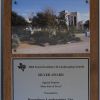Combat Spring Bugs this Winter with Natural Insect Control!
December 5, 2016 | By webadmin
Did you know? Our winter weather doesn’t kill many pests, leaving them to overwinter on your plants until spring. During late winter, you can use a relatively benign method of insect control which smothers overwintering insects and their eggs. There are various oils currently available that can be used at other points in the growing season, but the term dormant oil typically refers to the timing of application when deciduous trees and shrubs have dropped their leaves and while plants are not actively growing.

Reduce the fungal disease, black spot, on roses by applying dormant oil this winter.
What is Dormant Oil and When is it Applied?
Often recommended for fruit trees, dormant oil can also be effective on many other species of plants in controlling scale, mites, leafrollers, webworms, aphids and many other damaging pests. It is highly recommended for use on crape myrtle scale, which has caused widespread damage in the Dallas-Ft. Worth area. If applied just as the dormant season is ending, insects beginning to feed are more susceptible. Because it kills mainly by suffocation, the oil must come into direct contact with the pest. This means of control brings minimal harm to other beneficial insects and affected pests are unlikely to develop a resistance, so there are lots of good reasons to utilize it.
Horticultural oil is a general term you may see used to describe these types of treatments. Often conventional dormant oils are petroleum based mineral oils that have been known to stunt new buds, kill young leaves or cause leaf scorch during active growth, hence the winter timing recommendation. Because this natural method is so effective, newer lighter plant based oils, called horticultural oils, have been developed that can also be applied to actively growing vegetation at lighter applications.
Tips for successful application of horticultural oils
While we offer applications of horticultural oil to our maintenance clients as part of their year-round maintenance plan, it is also easy to apply for the DIY’er. Many products include a surfactant to mix the oil with water so it is easy to apply with a hose-end sprayer. Spray to coat all surfaces of the branches and trunk, paying particular attention to crevices where insects and eggs tend to reside. Always follow label directions, which include different ratios for specific insects and plants as well as temperature restrictions. Use during extremely hot or cold temperatures is not recommended.
Ensuring that plants have been well watered the day before applying horticultural oils helps protect plants from damage. Keep in mind that some trees are sensitive to these products, including japanese maples, blue junipers and red oaks, to name a few. You'll find that control of problematic pests will be much easier during the active growing season when you take this proactive step in winter.
